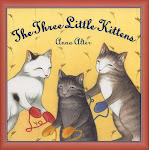Alvina (fellow
Blue Rose Girl) recently passed on a link to
this article in the New York Times, and I think is worth repeating here. Its the first optimistic view of how changes in technology will affect publishing that I've read. It can be hard to keep a positive view of the future of the book, considering the economic hardships everyone is facing, and a publishing industry that has been struggling for quite some time. But if we really believe that a book is a unique and perfect tool, then we can have faith that it will always have a place in our lives.
Some highlights:
"As a technology, the book is like a hammer. That is to say, it is perfect: a tool ideally suited to its task. Hammers can be tweaked and varied but will never go obsolete. Even when builders pound nails by the thousand with pneumatic nail guns, every household needs a hammer. Likewise, the bicycle is alive and well. It was invented in a world without automobiles, and for speed and range it was quickly surpassed by motorcycles and all kinds of powered scooters. But there is nothing quaint about bicycles. They outsell cars....
...Now, at this point one expects to hear a certain type of sentimental plea for the old-fashioned book — how you like the feel of the thing resting in your hand, the smell of the pages... that’s not my argument. I do love the heft of a book in my hand, but I spend most of my waking hours looking at — which mainly means reading from — a computer screen. I’m just saying that the book is technology that works.
Phonograph records and CDs and telegraphs and film cameras were all about storing and delivering bits — information, in its manifold variety — and if we’ve learned anything, we’ve learned that bits are fungible. Bit-storing technologies have been arbitrary, or constrained by available materials, and thus easy to replace when the next thing comes along. Words, too, can be converted into bits, but there’s something peculiar, something particularly direct, about the path from the page to the brain.
It is significant that one says book lover and music lover and art lover but not record lover or CD lover or, conversely, text lover."






































 When I went out to check the mail today I was surprised to find my very first copy of What Can You Do with an Old Red Shoe?, at last! Nothing compares with holding a freshly printed book in your hands for the first time, especially one you've been working on for several years. Its a thrill to see the way all the little details came together. I love the smell of the ink and the crackling of the binding when I open it.
When I went out to check the mail today I was surprised to find my very first copy of What Can You Do with an Old Red Shoe?, at last! Nothing compares with holding a freshly printed book in your hands for the first time, especially one you've been working on for several years. Its a thrill to see the way all the little details came together. I love the smell of the ink and the crackling of the binding when I open it.


















